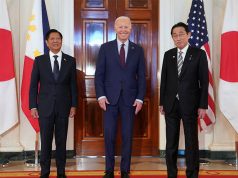
MANILA – China pushed for a maritime code of conduct with Southeast Asian countries that would not be legally binding, the Philippine foreign minister said on Tuesday.
Alan Peter Cayetano said some countries wanted the South China Sea code to be legally binding, and China preferred the less forceful “binding”. He said all parties realized it was better to drop all mention of it from the framework and move forward.
The Association of South East Asian Nations (ASEAN) and China hailed the adoption on Sunday of a negotiating framework for the code of conduct (COC) as progress towards preventing disputes.
Cayetano cited the framework as an example of how parties that were historically at odds were co-operating, but his comments indicate that China had initially set out to create a code that had no legal binds.
“Everyone is more open to negotiations,” Cayetano told a news conference. “At first, words about being non-legally binding, China dropped, just said ‘OK, approve the framework and go to the COC’.”
Critics say Beijing’s end game is to either negotiate what amounts to a gentleman’s agreement, or stall and buy time to expand its defense capability on its manmade islands.
ASEAN has long wanted to sign China up to a set of laws to prevent disputes over energy reserves, fishing, and land reclamation, and avoid military conflicts in the South China Sea, where Taiwan, Vietnam, Brunei, Malaysia, the Philippines and China have competing claims.
ASEAN and China say the framework is only a guide for how the code will be established, but critics say the failure to outline as an initial objective the need to make it legally binding and enforceable creates doubts about how effective the pact can be.
Australia, Japan and the United States on Monday urged ASEAN and China to ensure the code is “legally binding, meaningful, effective, and consistent with international law”.
China’s Foreign Minister Wang Yi on Sunday said it was too soon to discuss components of the code, but whatever is agreed must be stuck to.
“If China is saying now that we’re going for ‘binding’, will we stop talking to them?” Cayetano asked.
“The problem with legally binding is … what are the penalties, what are the mechanisms for adjudication, what tribunal, what court and who will enforce?. I think some countries are just being practical.”
How to address Beijing’s assertiveness in the South China Sea has long been ASEAN’s most divisive issue, with China’s influence on the group looming large and complicating efforts to reach consensus decisions.
China is particularly sensitive to even oblique references in ASEAN statements to its artificial islands and rapid development of defense facilities in disputed waters.
Host the Philippines, which is expanding its economic ties with China, made no mention of those in its chairman’s statement on the 27-nation ASEAN Regional Forum issued late on Tuesday.
WATCH NEWS5’S VIDEO REPORT:









